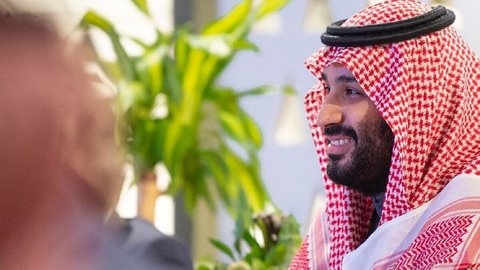El presidente chino, Xi Jinping, asevera que la «histórica ampliación» augura un «futuro radiante» para los países integrantes del bloque de economías emergentes
Los BRICS, el bloque de economías emergentes integrado por Brasil, Rusia, India, China y Sudáfrica, han decidido invitar a seis nuevos miembros: Arabia Saudí, Emiratos Árabes Unidos, Irán, Argentina, Egipto y Etiopía. En torno a cuarenta países habían solicitado la adhesión o su deseo de hacerlo. Las economías de los BRICS, que nació en 2009 con la aspiración de constituirse en contrapeso al mundo occidental, representan casi un cuarto del PIB y un 42% de la población mundial.
Tras la «histórica» decisión, los nuevos miembros se incorporarán oficialmente a la organización a partir del 1 de enero de 2024, declaró el presidente sudafricano Cyril Ramaphosa. «Con esta cumbre los BRICS inician un nuevo capítulo», aseveró el mandatario sudafricano en relación con el aldabonazo de la organización de economías emergentes.
Para el líder de la primera economía del bloque Xi Jinping, la «histórica ampliación» augura un «futuro radiante» para los países integrantes del bloque, que aspira a seguir aumentando su relevancia en la esfera planetaria. El secretario general de Naciones Unidas, António Guterres, presente en la cumbre, instó a las instituciones multilaterales a «reformarse para reflejar el poder y las realidades económicas actuales», pues, a su juicio, las estructuras de gobernanza global «reflejan el mundo de ayer».
Por su parte, el presidente argentino, Alberto Fernández, afirmó desde Buenos Aires que su voluntad de ingresar en los BRICS se debe a que la organización es «un referente geopolítico y financiero importante, aunque no el único, para este mundo en desarrollo», en declaraciones recogidas por la agencia AFP.
Para las autoridades de la República Islámica de Irán la adhesión a la organización es «un éxito estratégico para la política exterior» del régimen. Más prudente fueron los representantes de la monarquía saudí, cuyo ministro de Exteriores, el príncipe Faisal bin Farhan, aseguró «apreciar la invitación», aunque esperará a conocer más detalles sobre «la naturaleza de la adhesión».
Con todo, la eventual incorporación de Arabia Saudí a la organización de economías emergentes ha de interpretarse como una apuesta por reforzar el eje sino-ruso frente a Occidente en general y Estados Unidos en particular. Por su parte, los representantes del Gobierno de Etiopía aseguraron que la incorporación a los BRICS supone un «momento fuerte» para su país.
Las negociaciones que desembocaron en la decisión de ayer tuvieron lugar en la jornada del miércoles a puerta cerrada tras dos días de discusiones en Johannesburgo protagonizadas por el presidente brasileño Lula da Silva, el primer ministro indio Narendra Modi, el presidente chino Xi Jinping y el sudafricano Cyril Ramaphosa.
«Las discusiones fueron bastante intensas y se desarrollaron no sin problemas», afirmó el ministro ruso de Exteriores, Serguéi Lavrov, en una comparecencia ante los medios. La elección se hizo en función del «peso, la autoridad» y «la posición sobre la escena internacional» de los candidatos, añadió Lavrov en declaraciones a AFP.
English version
The BRICS invite Saudi Arabia, Emirates, Iran, Argentina, Egypt and Ethiopia
Chinese President Xi Jinping asserts that the «historic enlargement» augurs a «radiant future» for the countries that are members of the bloc of emerging economies
The BRICS, the bloc of emerging economies made up of Brazil, Russia, India, China and South Africa, have decided to invite six new members: Saudi Arabia, the United Arab Emirates, Iran, Argentina, Egypt and Ethiopia. Around forty countries had applied for membership or wished to do so. The economies of the BRICS, which was born in 2009 with the aspiration of becoming a counterweight to the Western world, represent almost a quarter of GDP and 42% of the world population.
Following the «historic» decision, new members will officially join the organization from January 1, 2024, South African President Cyril Ramaphosa declared. «With this summit, the BRICS begin a new chapter,» said the South African president in relation to the knock on the organization of emerging economies.
For the leader of the first economy of the bloc, Xi Jinping, the «historic enlargement» augurs a «radiant future» for the countries that are members of the bloc, which aspires to continue increasing its relevance in the planetary sphere. The Secretary General of the United Nations, António Guterres, present at the summit, urged multilateral institutions to «reform themselves to reflect current power and economic realities», since, in his opinion, global governance structures «reflect the world of yesterday».
For his part, the Argentine president, Alberto Fernández, stated from Buenos Aires that his willingness to join the BRICS is due to the fact that the organization is «an important geopolitical and financial benchmark, although not the only one, for this developing world». in statements collected by the AFP agency.
For the authorities of the Islamic Republic of Iran, joining the organization is «a strategic success for the foreign policy» of the regime. More prudent were the representatives of the Saudi monarchy, whose Foreign Minister, Prince Faisal bin Farhan, assured that he «appreciates the invitation», although he will wait for more details on «the nature of the accession».
All in all, the eventual incorporation of Saudi Arabia into the organization of emerging economies must be interpreted as a commitment to reinforce the Sino-Russian axis vis-à-vis the West in general and the United States in particular. For their part, the representatives of the Government of Ethiopia assured that joining the BRICS represents a «strong moment» for their country.
The negotiations that led to yesterday’s decision took place on Wednesday behind closed doors after two days of discussions in Johannesburg led by Brazilian President Lula da Silva, Indian Prime Minister Narendra Modi, Chinese President Xi Jinping and South African Cyril Ramaphosa.
The discussions were quite intense and they took place not without problems,» said the Russian Foreign Minister, Sergei Lavrov, in an appearance before the media. The choice was made based on the «weight, authority» and «position on the international scene» of the candidates, Lavrov added in statements to AFP.



